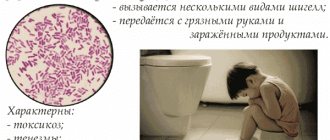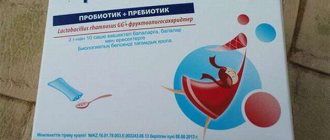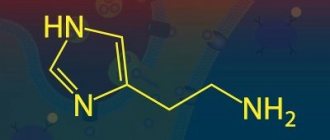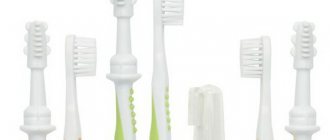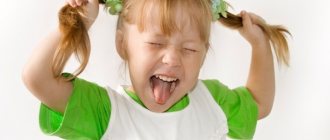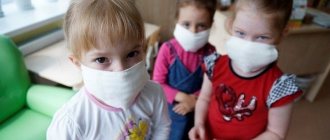There are a lot of things that children are not allowed to do until they are one year old - sausage, sweets, smoked foods, canned food, etc. But there are a number of products that still raise questions. Here are some of them:
1. Mushrooms.
Mushrooms should be used in the diet of children no earlier than 3 years of age. This is due to the fact that they are difficult to digest due to the chitin present in their composition - a plant fiber that interferes with the absorption of nutrients and also causes irritation of the intestinal mucosa.
2. Nuts.
Giving whole nuts before the age of 3 is useless, they will not be digested. In addition, they are highly allergenic products.
3. Sweet pepper.
It is not recommended in raw form for up to 1.5 years, as it contains a large amount of essential oils and fiber.
4. Eggplants.
Not recommended for children under 2 years of age as they are high in fiber and purine bases. In addition, they are a highly allergenic product.
5. Beets.
Again, it’s better after a year, since there is a lot of fiber and pectin, it behaves quite actively in the body. Highly allergenic. Although it can be boiled for a little over 10 months.
6. Legumes.
Up to 1.5 years is not advisable because they have gas-forming properties, and you also need to know how to cook them correctly. Some legumes contain a range of toxic components, including lectins, which act as hemagglutinins and trypsin inhibitors. When ripe, a number of seeds (such as kidney beans) contain toxic concentrations of these components, and it is therefore important to properly prepare these foods by thoroughly soaking and boiling them to avoid any toxic effects.
7. Cucumbers.
Difficult to digest, few useful substances, gas-forming.
8. White cabbage.
It is better not to use it in the diet of children under 1 year of age, because it causes gas formation.
9. Tomatoes.
An allergen that is difficult for children to digest.
10. Radish.
Causes gas formation, hard on the stomach.
11. Hard cheese.
Cheese contains vitamins A, B, PP, salts, calcium, phosphorus and lactic acid bacteria. Mild and low-fat cheese can be offered to children from one year old. Cheeses with 10% and 17% fat content are sold in stores; they are ideal for children. The daily allowance of cheese is 3 g, weekly: 21 g. cheese is also a concentrate of magnesium, potassium, and sodium salts. Therefore, it is given to young children in limited quantities.
12. Pasta.
Pasta is not offered to children under one year old, because... enzymes that help digest flour appear only after a year. From the age of one year you can introduce pasta as an independent dish no more than twice a week; on this day porridge is canceled.
13. Foreign fruits and vegetables.
Products not typical for your latitude are offered no earlier than a year.
14. Soups with meat broth
. Not earlier than a year. The value and at the same time the danger of the broth lies in the fact that it does not undergo “processing” in the stomach - it immediately “runs” through the stomach into the duodenum. And since the digestibility of this product is excessively high, everything of poor quality that can happen in the broth will go straight into the small intestine. Simply put, you can get poisoned by it. And low-quality is both weathered meat, bones and poultry, and the same products of dubious origin (not a chicken from a village with a veterinarian’s stamp indicating that it does not have brucellosis and salmonellosis, but a broiler from a poultry farm), and simply meat and poultry that have been in the refrigerator longer weeks.
On the issue of allergies and broth. Meat and broths from chicken, pig, veal, and duck can cause a serious allergic reaction.
15. By-products.
Not earlier than 1.5 years. Offal, fatty meat broths, fatty soup, any meat of young animals, even seemingly innocent lambs and chickens contain a huge amount of purine bases.
And the breakdown product of these purines is nothing more than uric acid. When purines enter the body in excess, they disrupt metabolism. The elimination of uric acid is the direct responsibility of the kidneys (and we understand that in children they are not yet fully mature), but if there is an excess amount of this acid in the body, the kidneys simply cannot cope with the load that has fallen on them. By the way, in an adult this is fraught with gout, because the joints are the first to suffer.
Source
Prohibited products for children
The small organism grows quickly and requires proper and balanced nutrition for its development. Carbohydrates, fats, proteins, vitamins, macro- and microelements are necessary substances for the normal physiological development of muscle and bone tissue, the brain, and the proper formation of internal organs: heart, kidneys, lungs, spleen, liver.
A child’s subsequent health and ability to realize himself in adulthood depend on proper nutrition in the first years of life. Therefore, it is important to lay the foundation of proper nutrition from an early age in order to avoid health problems in the future.
What should children under one year not eat?
Most pediatricians have come to the conclusion that breastfed children should not receive whole cow's or goat's milk in any form. If a child is deprived of the opportunity to receive mother's milk, then infant formulas adapted to breast milk are recommended for such children.
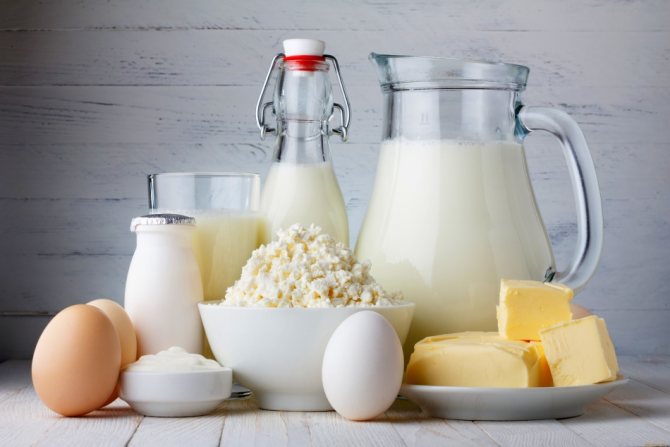
Cow and goat milk
Cow's milk is considered heavy food for babies. It contains a large amount of proteins, fats, and mineral salts. The child's kidneys begin to work with great effort, which leads to their overload. Fluid is excreted in greater quantities than is necessary according to the physiological norm, which leads to thirst for the baby. He receives a new portion of milk, thus creating a “closed ring”.
Cow's milk does not contain enough iron, which is necessary for a growing child's body. Goat's milk contains less vitamin A than cow's milk, although in other respects it is closest to mother's milk.
Consumption of cow's milk in the early period of life can lead to the development of diabetes mellitus, iron deficiency anemia, and allergic diseases.

In addition, children under two years of age have not yet developed enzymes capable of breaking down the nutritional components of cow's milk. As a rule, cow's milk is not completely absorbed by the child's body.
IMPORTANT: It is not recommended to give kefir to children under one year of age, as it is highly acidic and contains alcohol.
What should children under 3 years old not eat?
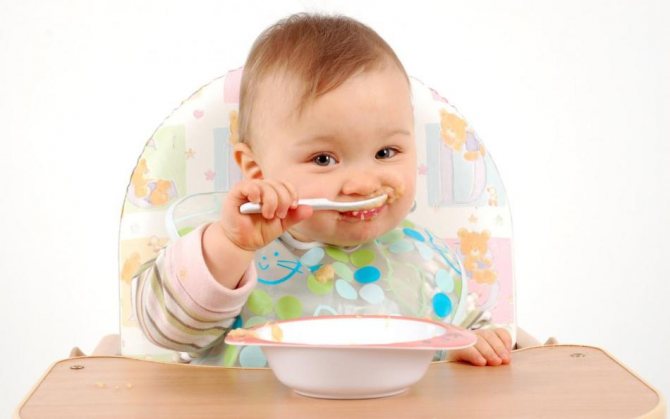
Sugar and salt
Salt and sugar should not be given to children, at least until they can be avoided. It is best not to give these products until the age of three. Since adding salt and sugar is considered traditional in cooking, sooner or later the baby will become familiar with the taste of salty and sweet food in kindergarten or school.
IMPORTANT: As Roskontrol showed: many children's fermented milk products contain a high percentage of sugar. Therefore, babies should be given unsweetened and not very sour natural fermented milk products with a short shelf life.
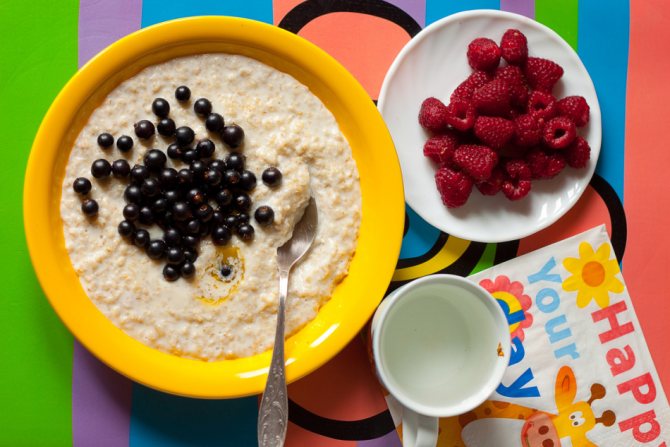
Semolina
Gone are the days when semolina porridge was considered an indispensable product for baby food. It turns out that semolina contains gliadin - one of the components of gluten, which complicates the work of children's intestines. Phytin, another ingredient in semolina, inhibits the absorption of vitamin D and calcium.
Semolina gluten can cause allergic reactions in a child in the form of red itchy spots. Excessive feeding of semolina porridge often leads to overweight children, which is difficult to get rid of later.
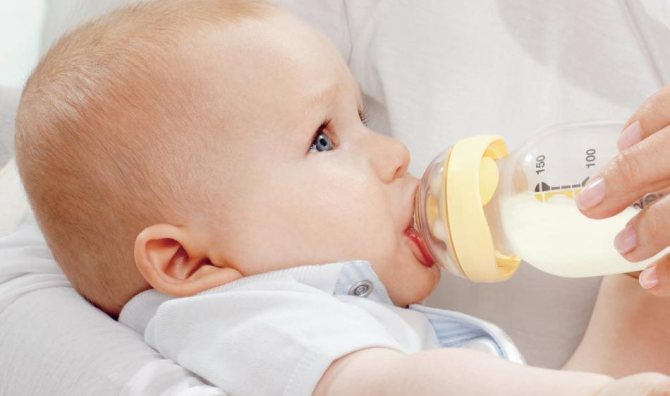
Juices or purees?
Many pediatricians disagree: is it possible to give children industrially produced and home-made juices? Some allow babies to be given juice, while other doctors do not recommend giving babies juice until they are one and a half years old, but insist on eating fruit and vegetable purees. Their motivation is based on the fact that such a diet is rich in plant fiber and has a beneficial effect on the baby’s intestines.
What should children 4-5 years old not eat?
Parents often switch children aged 4-5 years to adult food.
IMPORTANT: Dairy and fermented milk products made according to general production standards, and not according to special baby food technology, are especially dangerous for children.
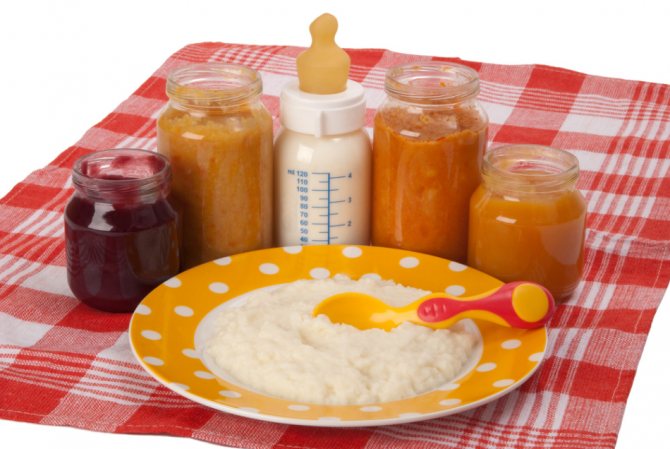
Honey
Honey is a healthy natural product containing many biologically active components, macro- and microelements, and vitamins. But this beekeeping product can cause allergic reactions. In early childhood, it is better to avoid honey and introduce it into baby food with caution later.
Sausages and sausages
Sausages and sausage products are allowed to be given to children after the age of three, prepared using special technology for baby food. Labels on such products usually contain inscriptions indicating at what age the product can be consumed. There will be no great harm to the child’s health if he eats baby sausages no more than once every two weeks.
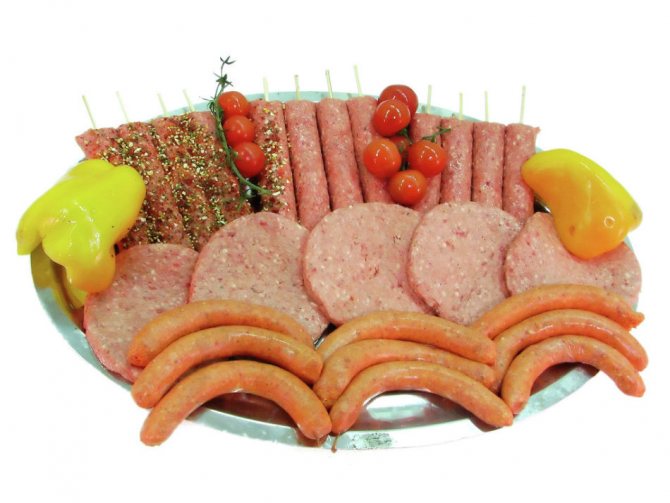
IMPORTANT: Roskontrol does not recommend giving small children sausage products intended for adult food. These products contain many ingredients that are harmful to the child's body: preservatives, flavor enhancers, phosphates, nitrites and other harmful "eats".
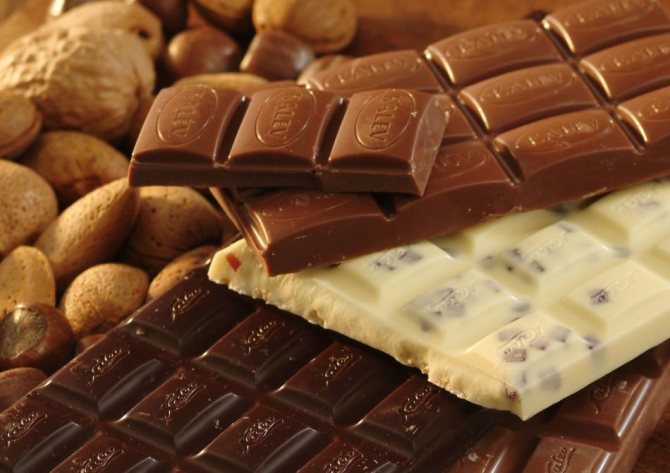
Chocolate
Sweet treats should not be given to babies for a number of reasons:
- chocolate contains sugar
- Cocoa powder can cause allergies
- Cocoa butter is difficult for a child’s gastrointestinal tract to digest
Seafood and red caviar
Seafood and red caviar are healthy foods that contain a lot of complete protein and other healthy components. But this is not food for younger children. The ingredients of seafood products are very allergenic, moreover, seafood products and red caviar are processed with many preservatives and have a strong salty taste, which is unacceptable in baby food.
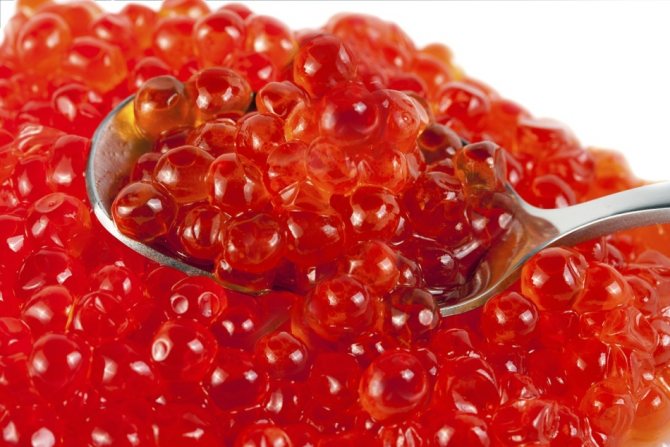
Strawberries, citrus and other exotic fruits
Beautiful and tasty exotic fruits and fruits: kiwi, avocado, citrus fruits, pineapple, can cause severe allergic skin manifestations not only in babies, but also in older children. Strawberries, wild strawberries, and raspberries also contain allergens; it is better not to give them to children, especially those prone to allergic reactions.
What should children absolutely not eat?
For babies in the first years of life, there are prohibited foods:
- whole milk
- honey
- mushrooms
- nuts
- black and green tea
- coffee
- chocolate
- fast food
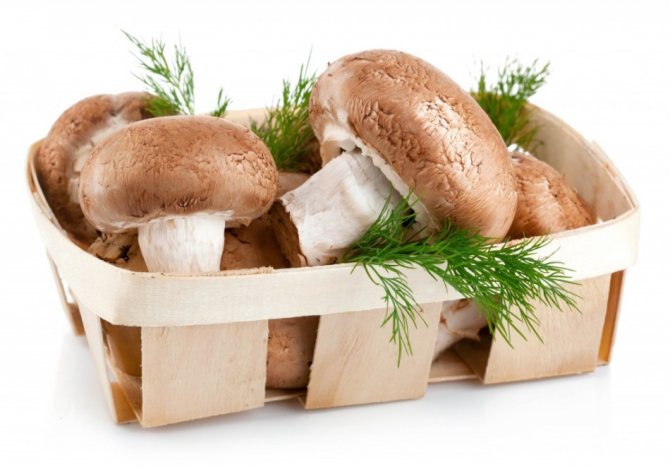
In the industrial production of baby food, there is a list of products that are unacceptable for children:
- vinegar
- ethyl alcohol with a concentration of more than 0.2%
- apricot kernels
- sweeteners (except for those special for dietary and baby food)
- artificial flavors
- benzoic and sorbic acids (they are used as preservatives)
- hot and fiery spices: pepper, mustard, horseradish
- red meat, fish and poultry after refreezing
- trans fats and hydrogenated oils
- diffusion concentrates for juices
- food additives (various E additives not permitted in Russia for the production of baby food)

How to Choose Real Baby Products
Study the labeling
Products intended for children must contain a mention of the child's age. For example: “for children from 6 months” or “for feeding children from 3 years old”. If you do not find such an inscription in the product labeling, it is not suitable for children at all.
Don't trust children's names
By law, manufacturers cannot mislead buyers by using names with diminutive suffixes.
Read the ingredients information
Prohibited foods for children for various diseases
Childhood illnesses are a test not only for the child’s body, but also for parents. Only through the joint efforts of a doctor and a loving mother and father can the child’s recovery be accelerated, and this is: drug treatment, proper regimen and hygiene, good nutrition, excluding certain foods from the diet for various diseases.
If children are lactose free, what should they not eat?
Lactase deficiency is associated with the absence or insufficient amount of an enzyme capable of breaking down milk sugar - lactose, which enters the body with dairy products.
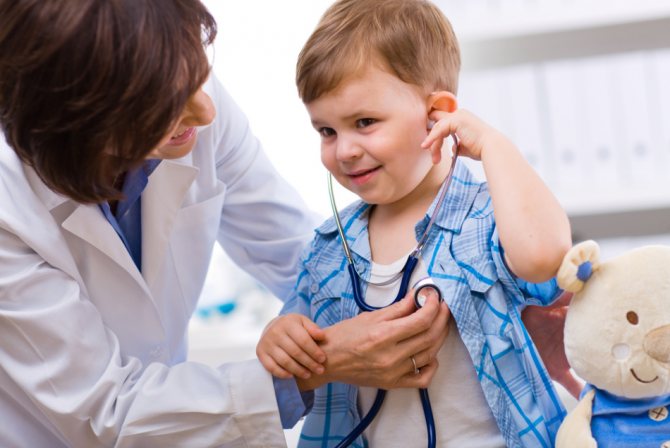
With this disease, children experience gastrointestinal disorders: diarrhea or constipation, weight loss, foul-smelling foamy stools, regurgitation, vomiting, colic, bloating.
If lactase deficiency is suspected, babies are transferred to a lactose-free or low-lactose diet. After diagnosis and treatment of the disease causing lactase deficiency, the child undergoes control tests. If the dynamics are positive, the doctor may give permission for the gradual introduction of fermented milk products into the diet.
IMPORTANT: Lactose is found not only in milk and dairy products, it is used in the production of medicines, margarine, candies, bread products, ham and sausages. Before purchasing any product, you should carefully read the ingredients on the label.
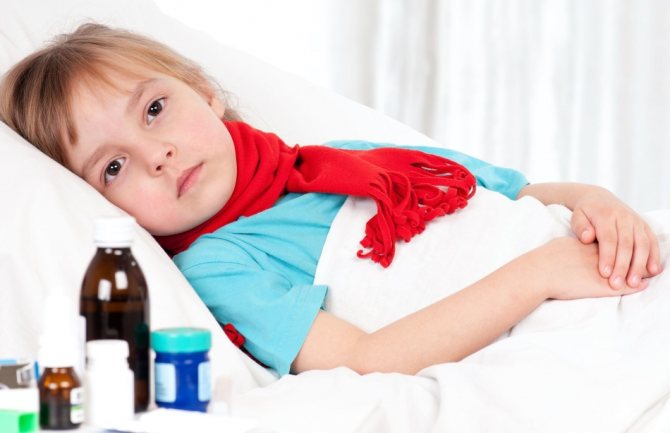
What should children not eat if they have a sore throat?
Sore throat is a disease caused by viruses and bacteria. Characterized by severe sore throat and high fever. During an illness, a child usually has no appetite and this worries parents very much.
During the acute course of the disease, you should not force-feed the baby. Lack of appetite is the body’s protective reaction to illness. After a few days, the child will begin to recover and the desire to eat will appear again.
Children with sore throat should not be given solid food. The food should be well ground, preferably to a puree state. Sour drinks, hot and cold foods are contraindicated for a sore throat. Food should be warm and have a pleasant taste.
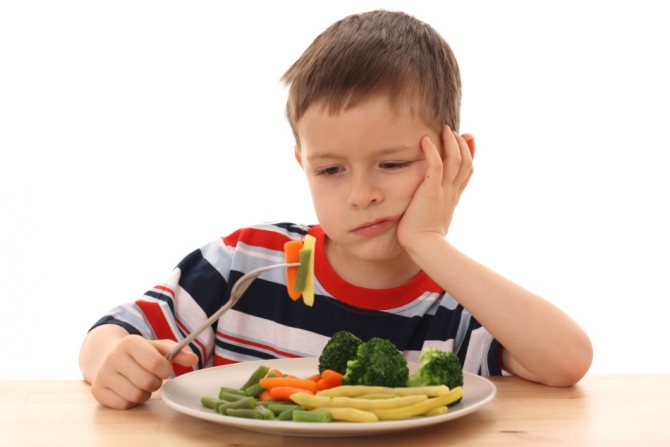
What should children not eat if they have allergies?
Allergic manifestations in children are caused by many reasons: food intolerance, drug intolerance, allergies to dust, animal hair, pollen, etc. During allergic manifestations, it is very important to adhere to the correct diet and completely eliminate foods that provoke allergies.
Products that cause allergies
- cow's milk
- chicken eggs
- baked goods and pasta containing gluten
- honey
- chocolate
- citrus fruit
- red berries: strawberries, wild strawberries, raspberries
- chicken meat
- seafood and some types of fish
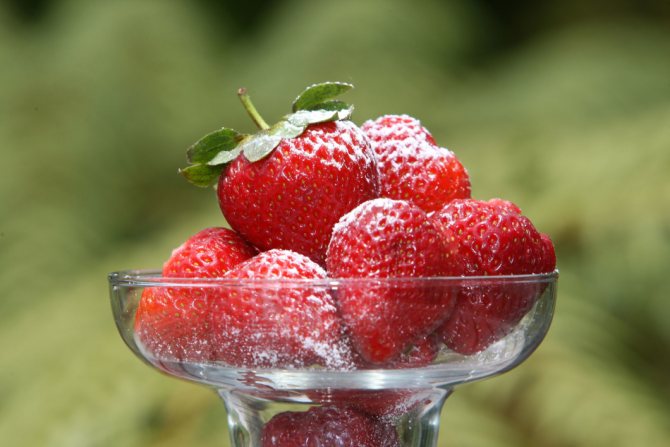
What should children not eat if they have chickenpox?
Chickenpox is an infectious viral disease that affects almost all children attending preschool or school institutions. The acute period of the disease is associated with a rise in temperature, headache, and itchy skin rashes in the form of blisters filled with liquid.
To help your child cope with the disease and quickly move into the recovery stage, you need to follow the right diet, consisting of healthy and nutritious foods. During illness, you should exclude foods that are difficult for the child’s body to digest and can cause a number of complications in the gastrointestinal tract.
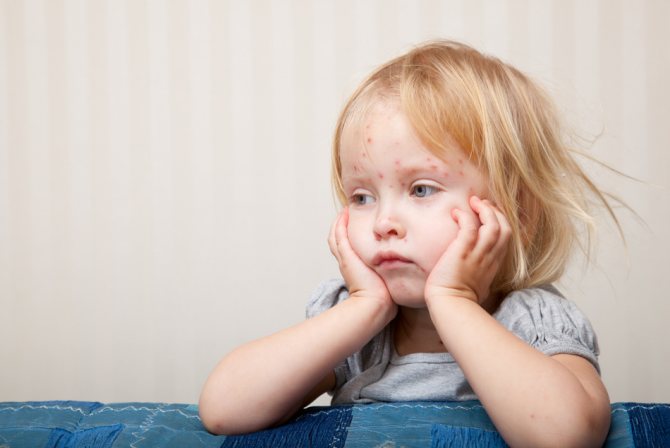
It is not recommended to feed a sick child fatty, spicy, salty, sour and fried foods. Food should be balanced, light, soft in consistency, and warm. Too hot and cold food is contraindicated for the child.
Foods to avoid during chickenpox:
- milk
- garlic
- ginger
- citrus
- red meat
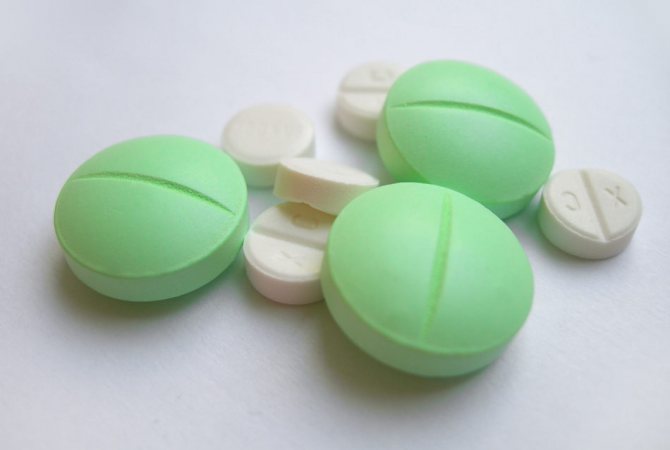
What should children not eat if they have dysbiosis?
Dysbacteriosis is a disease associated with disturbances in the normal intestinal microflora of the body. An imbalance between “beneficial bacteria” and pathogenic ones causes intestinal dysfunction.
The child is worried about:
- impaired intestinal motility (constipation or diarrhea)
- stomach ache
- vomit
- bloating
- apathy and lethargy
- lack of appetite
The causes of dysbiosis in children are different:
- consequences of antibiotic therapy
- poor nutrition
- lack of vitamins
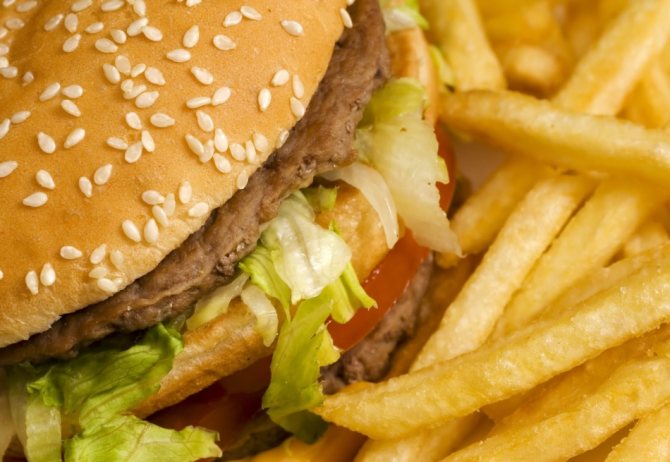
IMPORTANT: A proper diet for dysbiosis and the exclusion of unacceptable foods contribute to the baby’s rapid recovery.
Foods to avoid if you have dysbiosis:
- sour berries and fruits (cherries, sour apples, cranberries, pomegranate, tangerines)
- raw vegetables and fruits
- foods that cause fermentation in the intestines (grapes, cabbage, legumes, carbonated drinks)
- sweets
- canned food
- smoked meats
- fast food dishes
What should you not eat if your baby has colic?

Colic often accompanies a little person in the first months of life. The baby is born with a sterile intestine and an immature gastrointestinal tract. There are not yet enough enzymes in the child’s body that can fully break down food. This is why a nursing mother should pay great attention to her nutrition.
Foods that should not be included in the diet of a nursing mother
- whole milk
- cabbage
- sparkling water
- store-bought vegetable and fruit juices
- sweets and baked goods
- chocolate
- fatty foods
- legumes
To prevent colic in a baby, a nursing mother's diet should consist of steamed, boiled or baked foods. Preference should be given to green-colored vegetables and fruits. As the child continues to grow up and colic disappears, the choice of food products can be expanded, based on the doctor’s recommendations.
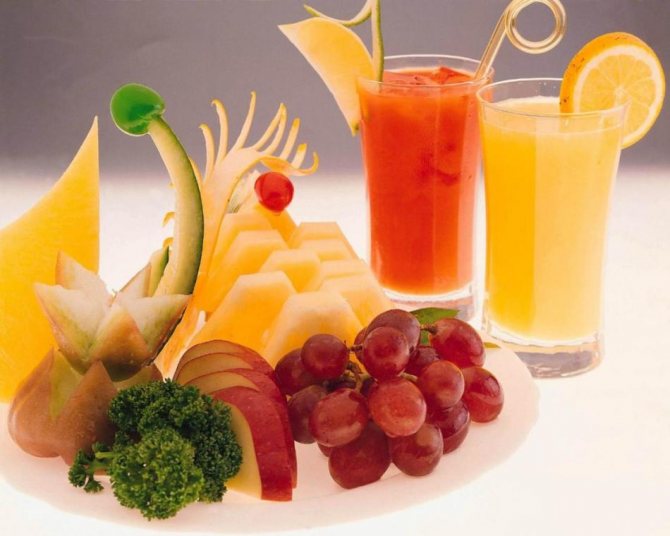
What should you not eat if your child has diarrhea?
- Diarrhea in a child can be caused by various reasons. These include poisoning, viral and infectious diseases, teething, gastrointestinal diseases, etc. But no matter what the appearance of a digestive tract disorder is associated with, the key to successful recovery of the body is properly prescribed nutrition in case of illness
- If breastfed infants have diarrhea, you should not stop breastfeeding. Pediatricians recommend increasing the number of feedings, but reducing the dose of milk to avoid overfeeding and reduce the load on the baby’s gastrointestinal tract
- Formula-fed babies should be fed in the same way. That is, reduce the dose of formula per feeding, but increase the frequency of feedings. It is recommended to use adapted fermented milk and low-lactate mixtures
- For older children who have switched to “adult food”, a special diet should also be developed by a doctor. In this case, food must be prepared according to certain rules
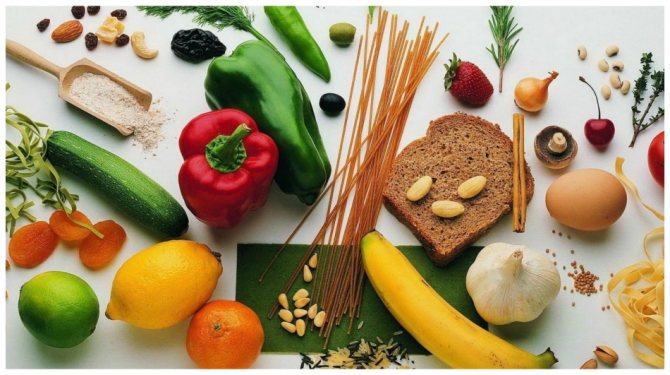
Foods that are difficult to digest and cause fermentation processes in the intestines should be avoided. It is recommended to boil, bake, steam food. Products for dishes should be crushed with a blender or ground through a sieve. You should not eat fatty foods. Porridge (rice, oatmeal, buckwheat) should be boiled in water without adding milk.
Foods prohibited for diarrhea in children
- fresh vegetables, fruits and berries
- fat meat
- fresh bread
- sweet products
- carbonated drinks
- concentrated meat broths
- milk

What should children not eat if they have rotavirus?
Rotavirus infection is called “intestinal flu”. The disease is transmitted by viruses through food, especially dairy products. Children from 6 months to 2 years are most often susceptible to contracting a viral infection.
Intoxication of a child's body leads to fever, intestinal colic, loose diarrhea, and dehydration.
IMPORTANT: Dehydration occurs very quickly in young children. With intestinal flu, a loss of 10% of fluid can have a serious impact on the baby's health, and in some cases even lead to death.
If a child is sick with rotavirus infection and refuses food, you should not insist and force-feed the baby. But you need to give your child frequent small portions of water every half hour. This is an important and strict requirement that must be followed to avoid fluid loss.
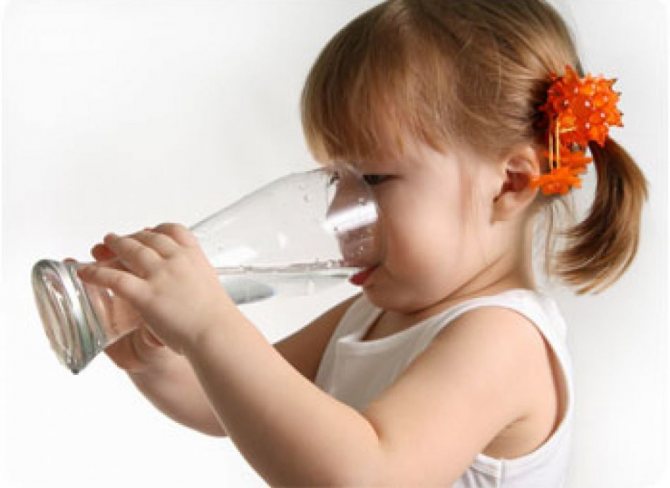
For intestinal flu in children, the following recommendations should be followed:
- During the acute period of infection, accompanied by high fever and vomiting, it is better not to feed the child, but to give him saline rehydration solutions and drinking water
- Infants should be given breast milk little by little, and water between feedings.
- Formula-fed babies should switch to lactose-free formulas during the period of illness, in consultation with a pediatrician.
- Eliminate from the diet foods that irritate the intestines: fried, salty, canned foods, foods containing coarse fiber
- Feed your baby in small, frequent meals
- Food should be steamed and given in a crushed or pureed state.
- During the recovery period, you should prepare boiled dairy-free porridges, weak meat and vegetable broths, give pureed fruits and vegetables, and fermented milk products
IMPORTANT: Until stool normalization, the following should be excluded from the child’s diet: whole milk, juices, fresh fruits and vegetables
What should you not eat if you have stomatitis in children?
Stomatitis is a disease associated with inflammation of the oral mucosa. The disease causes the child suffering in the form of pain, high fever, and the inability to eat due to ulcers in the mouth. Feeding a child with this disease is extremely difficult. This circumstance worries parents very much.
Recommendations for feeding a child with stomatitis
- It is not allowed to feed the child spicy, sour and salty foods that can irritate the oral mucosa
- The temperature of the food should be warm and comfortable for consumption. Hot and cold foods are not suitable for feeding a baby
- Cocoa and chocolate are excluded from the menu, sweet foods are limited as much as possible
- The solid consistency of food is not suitable for nutrition. Food should be in the form of purees, soups, liquid cereals
- It is not recommended to eat dry bread and coarse baked goods.
- Tomatoes, sour berries and fruits, and citrus fruits are excluded from the diet.
- Garlic, onions, radishes, and spices that irritate the oral mucosa are not allowed in the diet.
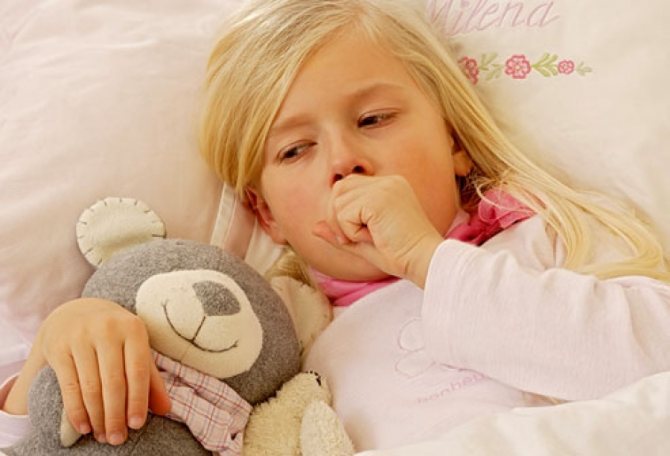
What should a child not eat if he or she has a fever?
High temperature is a protective reaction of the body. Lack of appetite and reluctance to eat in the first days of illness are normal. You cannot force your child to eat at this time.
At high temperatures, it is preferable to give children plenty of fluids in the form of sweetened teas, fruit drinks, compotes with dried fruits, and jelly. Such drinks are rich in vitamins, which a sick child really needs.
IMPORTANT: At high temperatures, all dairy products should be excluded from the child’s diet: whole milk, cottage cheese, kefir, yogurt, cheese. It is not recommended to eat porridge cooked in milk.
Milk protein (casein) is practically indigestible at high temperatures. Products containing milk churn into a rubbery mass in the baby's stomach. When the temperature drops, there is a high risk of acetone syndrome, which manifests itself in the form of vomiting.
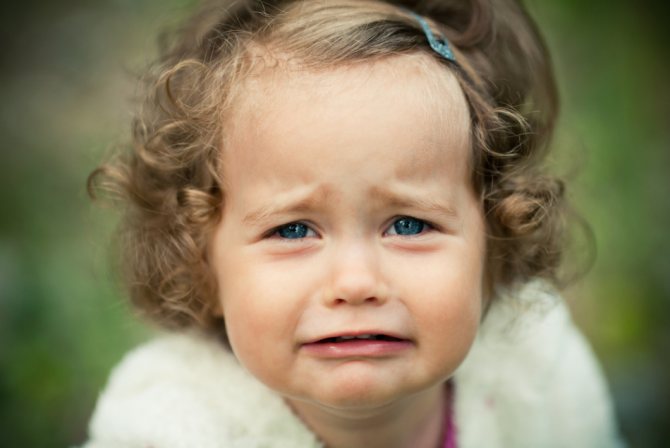
What should a child not eat after mantou?
The Mantoux test is carried out to diagnose a disease in children - tuberculosis. The examination is carried out by intradermal injection of tuberculin, which is a collection of filtrates of mycobacteria killed by heating.
Tuberculin is a strong allergen that can cause an allergic reaction in children prone to allergies.
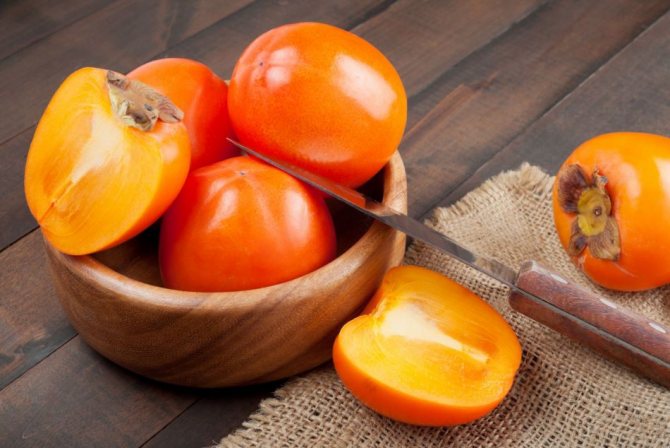
IMPORTANT: In order not to distort the child’s true reaction to the Mantoux test, foods that can cause an allergic reaction should be excluded from his diet.
Allergenic products that are not allowed to be consumed before and after the Mantoux test:
- cow's milk
- fish
- seafood (shrimp, lobster, crayfish, oysters)
- Red caviar
- eggs
- chicken meat and broth
- chocolate
- nuts
- citrus and exotic fruits (pineapples, persimmons, mangoes)
- fruits and berries with a predominance of red and bright orange pigment (strawberries, raspberries, red apples, apricots)
- canned food
- sweets
- industrial food products with food additives (chips, crackers)
- fast food
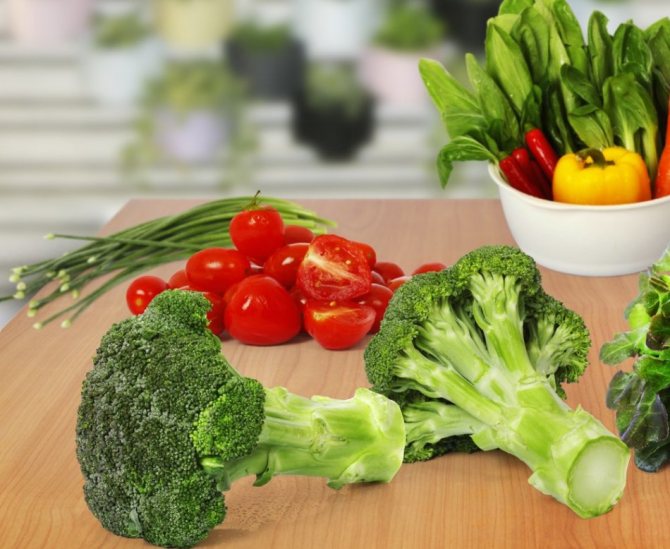
What should a child not eat if he is constipated?
Due to imperfections in the children's gastrointestinal tract, poor diet, insufficient water intake and many other factors, children may develop constipation from time to time.
Dense and hard stools with painful sensations, difficulties during defecation - all these signs of poor intestinal motility cause great suffering to babies.
Pediatric doctors are engaged in finding out the causes of constipation and treating this disease. Constipation often occurs when a child is not eating properly and is switching to “adult food” early.
Foods to Avoid for Constipation
- fresh white bread and pastries
- pasta
- semolina and rice cereal
- slimy soups
- blueberry
- jelly
- strong tea, cocoa, coffee
Nutrition for a 1 year old child
What to feed a child per year
After your baby's first birthday, you'll likely notice a sharp decrease in his appetite. This is normal, and is due to the fact that the rate of its growth has slowed down, and therefore the need for large amounts of food has decreased. However, you must continue to closely monitor his diet, since at the age of one year a child needs 1000 kcal daily.
General feeding and nutrition tips:
- Encourage, but don't force, your baby to eat at a certain time.
Although it’s hard to believe, your child’s diet will balance out on its own within a few days if you offer him a range of healthy foods. - Offer your baby foods from all basic nutrition groups.
The main food groups include: vegetables (vegetable juices) - fruits (freshly squeezed juices without added sugar)
- bread (cereal or pasta)
- protein foods (lean meat, poultry, fish, beans, eggs, peanut butter)
- dairy products.
Babies 1 year and older should get about half of their calories from fat. Cholesterol and other fats are very important for their growth and development at this age.
Firstly, too hot food can cause burns in a child's mouth. And secondly, he may spend too much time eating food, waiting for it to cool down.
Although your baby is already able to run, talk and eat at the same time, this is very dangerous and can lead to suffocation.
Example of a one year old child's menu
When planning a menu for a child who is already 1 year old, remember that cholesterol and other fats are very important for his normal growth and development, so they should not be limited during this period. Do not worry that your baby will gain a lot of weight due to the large amount of fat, if his diet is within 1000 kcal per day, you have nothing to worry about.
In order for you to understand what a 1-year-old child’s menu should consist of, we have compiled a sample menu:
Breakfast
- 120g fortified breakfast cereal or 1 cooked egg
- 120 ml whole milk
- half a banana (can be added to porridge)
- 2-3 large strawberries (can be added to porridge)
Snack
- 1 slice of toast or whole wheat muffin with ½ tablespoon cream cheese or peanut butter or yogurt with chopped fruit
- ½ cup (120 ml) whole milk
Dinner
- half a turkey sandwich (chicken, tuna, egg salad) or peanut butter
- 120g cooked green vegetables
- ½ cup (120 ml) whole milk
Snack
- 30-60 grams of diced (grated) cheese or 2-3 tablespoons of fruit or berries
- 1 cup (240 ml) whole milk
Dinner
- 60–90 g cooked meat, pureed or diced
- 120g cooked yellow or orange vegetables
- 120 g pasta, rice or potatoes
- ½ cup (120 ml) whole milk
List of foods for a one-year-old child that are perfect for snacking
Fresh fruits
- Apples, bananas, peaches, nectarines, pears (finely chopped)
- Cherries, grapes, plums (chopped or pureed), pitted
- Orange or grapefruit pieces (cut into pieces)
- Strawberry
Dried fruits
- Apples, apricots, peaches, pears (cut into pieces)
- Dates, prunes (pitted and cut into pieces)
Vegetables
- Carrots, green beans (well cooked, diced)
- Steamed cauliflower, broccoli
- Pea puree
- Stewed spinach or greens
- Avocado slices or small cubes
Dairy
- Cheese (grated or diced)
- Cottage cheese
- Yogurt
- Milk
Bread and cereals
- Whole wheat bread
- Whole grain tortillas, pita bread (cut into small pieces)
- Crackers
- Whole grain cereals
Squirrels
- Fish (canned tuna, salmon, sardine)
- Peanut butter or other nut butters (spread thinly on whole grain bread or crackers)
- Beans or chickpeas (steamed or pureed), hummus
- Cooked tofu cubes or tofu sauce
- Hard boiled eggs
What should a 1 year old baby not eat?
List of foods that a year old child should not eat:
- Do not give food that is heavily sweetened or seasoned with spices, salt, or oil. These additives interfere with the child's ability to experience the natural taste of food and may be harmful to health.
- At 1 year old, your baby may still choke on large pieces of food. He will learn to chew food well only when he turns 4 years old. So make sure that everything you give your baby is well ground or cut into small, easy-to-chew pieces.
- Never offer: peanuts
- whole grapes
- cherry tomatoes (if they are not quartered)
- whole carrots
- seeds (pumpkin or sunflower)
- whole or large pieces of hot dogs
- meat sticks
- caramel and jelly candies
- pieces of peanut butter (however, you can spread the peanut butter thinly on crackers or bread).
If you still want to treat your one-year-old child to a hot dog or carrots, then you should cut them lengthwise into 4 parts and then cut them into small pieces.
Conclusion
The American Academy of Pediatrics recommends introducing first solid foods only after the baby is 6 months old. He can be given cereals, beaten to the consistency of a homogeneous puree, or vegetables and fruits cut into small pieces, and meat purees. Also, do not avoid foods that may cause an allergic reaction. In any case, before introducing your baby to solid food, consult a pediatrician who will give personal recommendations on creating a diet for your baby.
Criteria for choosing products for babies
There is no better nutrition for a newborn than breast milk. All doctors say this unanimously. But in order for it to be as nutritious and healthy as possible, a nursing mother needs to be more attentive to what she eats during this period. After all, the substances from these products will eventually enter the baby’s body, and it turns out that it is their baby who will “eat.”
What should a nursing mother categorically refuse?
- Spicy foods or dishes seasoned with hot sauces.
- Alcohol.
- Canned food.
- Cow's milk.
- Seafood.
- Honey, nuts, chocolate and everything that contains these products.
- Smoked and semi-finished products , including sausages, sausages and sausages.
- Exotic fruits , as well as fruits and berries of bright orange or red color.
Unusual prohibitions
If forbidden foods can somehow be understood and explained, then there is a whole list of various rituals that mothers are not recommended to do. They can be classified as ordinary superstitions, which, however, are quite tenacious.
So, what should you not do, according to superstitious prohibitions?
- You shouldn’t put your baby on the table - he’ll grow up to be a crybaby. Table and tears - what is the connection? If you think logically, you shouldn’t place your toddler on high objects (of course, a table) at all, since the baby may fall. That's why tears are inevitable, so the table has absolutely nothing to do with it.
- You should not blow in the little one's face - you will confuse his fate. This is often done by parents who want to calm their child down or make him laugh. Doctors rush to reassure: whether or not to blow in the face is a matter for mother and baby, since it is dangerous to do so only if adults do not monitor the freshness of their breath.
- You shouldn't kiss children's heels - they won't stand on their feet for a long time. Prohibited actions from the same series - it is not recommended to kiss the lips, otherwise he will not speak, etc. This can be done, however, do not forget about hygiene requirements.
- There is no need to look at sleeping babies - they will be fearful. The ban is somewhat reminiscent of the story about the table, but there is also a logical pattern in it. After all, having suddenly awakened, a child can become frightened when he sees an adult bending over him.
Parents should approach prohibited actions without much fanaticism. For example, prohibitions regarding harmful products are mandatory. But various superstitious prohibitions must be correlated with your own common sense, although it is worth noting that in some of them there is a grain of truth!
The issue of nutrition is one of the most important in the first year of a baby’s life. It is what a child eats that largely determines his health and development in the future.
Of course, every mother wants to know exactly what to give, when to give and in what quantity. Therefore, it is important to have a clear understanding of foods and their effect on the digestive system at such an early age!
It should be noted right away that there is no better food for a child than breast milk. All doctors say this, and my mother has probably heard it more than once. If there are no problems with this type of feeding, the question of what to feed the baby is off the agenda for up to 5 months.
If for some reason you had to give up breast milk, then purchase a high-quality (which is important!) adapted formula. When choosing it, you should consider the following aspects:
- Manufacturer
. The best mixtures are those produced in Switzerland (Nan, Nestozhen), Holland (Friso, Nutrilon), and Germany (Humana, Hipp). Domestic (Malyutka, Agusha) and Spanish mixtures (Semilak) are also popular.
Important!
Don't be alarmed by the presence of palm oil in most formulations. The fact is that when producing a product for babies, the oil is not taken in its pure form, but only an extract, those acids that make the mixture as close as possible to mother's milk. It is advisable that the composition lists palmitic acid rather than oil. It is acceptable to have the wording “modified palm oil”, this confirms its safety!
- Child's age.
Depending on the number of months, purchase a product indicating the first or second stage. The manufacturer always indicates information on the packaging. - Individual characteristics of the baby
. Now you can choose food for your baby with any preferences and needs. Thus, for babies with an allergy to cow's milk protein, goat milk formulas are offered (Nanny, Karbita), for premature babies (Humana, Hipp Pre), for those who have frequent regurgitation/colic/constipation (Frisov)
Having selected the mixture, carefully observe the child’s reaction!
Having decided on the issue of nutrition in the first months of life, the mother gradually faces aspects of complementary feeding - timing, healthy, acceptable and prohibited foods. Let's take a closer look at each of the questions.
